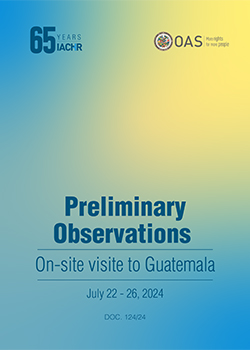- English
- Español

Press Release
IACHR presents preliminary observations of the on-site visit to Guatemala
August 30, 2024
Contact info
IACHR Press Office
Distribution List
Washington D.C.- The Inter-American Commission on Human Rights (IACHR) presents the preliminary observations of the on-site visit to Guatemala, which took place between July 22-26, 2024. The general objective of the visit was to observe the impacts of a process of weakening democratic institutionality and judicial independence in the country, since the last visit in 2017.
The purpose of the on-site visit was to analyze the human rights situation of groups in special situations of exclusion and historical discrimination, from the ethnic, racial and gender perspective; the situation of freedom of expression; citizen security; the rights to memory, truth, justice and reparation for serious human rights violations; and the situation of economic, social, cultural and environmental rights in Guatemala. In total, since 1982, the Commission has conducted twelve on-site visits to Guatemala, making it the most visited country by the IACHR.
During the five-day visit, the IACHR was present in Guatemala City and divided into eight groups to travel to the departments of Alta Verapaz, Izabal, Petén, San Marcos, Sololá, Totonicapán and Quetzaltenango, where it held meetings with representatives of indigenous communities and ancestral authorities in their territories, with peasant and Afro-descendant communities, as well as with civil society organizations. For the first time in its history, the IACHR visited the Garífuna people in Livingston, who are reportedly at risk of cultural extinction. It also visited the Chinautla River in Santa Cruz, which is part of the Motagua River basin, where it noted a serious contamination problem with profound impacts on biodiversity, the environment and the human rights of the communities that depend on it for subsistence, including the Mayan Poqomam people.
The Commission visited without restrictions the women's pretrial detention center in Zone 18 "Santa Teresa"; the pretrial detention center for men in Zone 18; the pretrial detention center for men and women in Cobán; and the Mariscal Zavala detention center, where it met with journalist José Rubén Zamora and former prosecutor Stuardo Campo. The Commission also visited residences for children and adolescents in need of protection. It also visited the reception centers for returnees located in Tecún Umán and Guatemala City. During its visit, the IACHR observed the cross-border dynamics of human mobility in the region, particularly at the Rodolfo Robles Bridge and the Suchiate River, and met with migrants.
In total, the IACHR held 31 meetings with representatives of the different branches of government and held more than 48 group meetings with human rights defenders and justice operators, activists, civil society organizations and victims of human rights violations, representatives of academia, trade unions, business associations, representatives of the diplomatic community and United Nations agencies.
The IACHR appreciates the invitation of President Bernardo Arévalo to visit the country, as well as the facilities provided. It also acknowledges the extensive information provided by the authorities of the public authorities. The Commission welcomes the willingness of the Executive Branch to make human rights a priority and encourages other State entities to work together to that end.
The IACHR thanks the civil society organizations for the information provided, as well as the victims who trusted and came forward to give their testimonies. The Commission recalls that, according to Article 56 of its Rules of Procedure, the State has the duty not to take reprisals of any kind against persons or entities that have cooperated with it during the visit by providing information or testimony.
The delegation was led by the Chair of the IACHR, Roberta Clarke, along with the First Vice-Chair, Carlos Bernal; the Second Vice-Chair, José Luis Caballero; Commissioner Arif Bulkan; and Commissioners Andrea Pochak, Rapporteur for Guatemala, and Gloria de Mees. The delegation also included the Executive Secretary, Tania Reneaum; the Deputy Executive Secretary, María Claudia Pulido; the Chief of Staff, Patricia Colchero, and specialists from the Executive Secretariat. The delegation also included the Special Rapporteurs on Freedom of Expression, Pedro Vaca, and on Economic, Social, Cultural and Environmental Rights, Javier Palummo.
As a result of the visit, the IACHR will prepare a country report in the coming months in which it will elaborate on the issues presented in the preliminary observations.
The Commission stresses that, under Article 56 of the IACHR Rules of Procedure, the State has a duty not to take reprisals or acts of retaliation of any kind against persons or entities that have cooperated with the visit by providing information or testimony.
The IACHR is a principal, autonomous body of the Organization of American States (OAS), whose mandate derives from the OAS Charter and the American Convention on Human Rights. The Inter-American Commission is mandated to promote the observance and defense of human rights in the region and acts as a consultative body to the OAS in this area. The IACHR is composed of seven independent members who are elected by the OAS General Assembly in their personal capacity and do not represent their countries of origin or residence.
No. 199/24
10:00 AM



